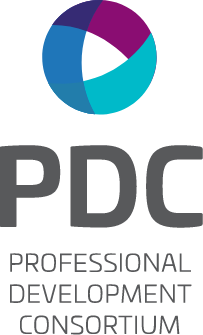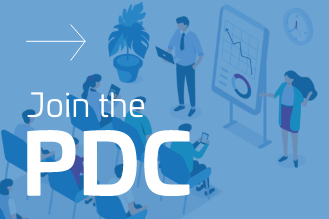You are here
Building Trust as a Tool of Engagement
April 4, 2024
Interview with Darien Fleming for PDC Blog
Building trust as a tool of engagement
PDC: Darien, you were telling us about your perspective on trust. We know trust is important to build in terms of relationships, but how should we think about building trust?
DF: Yeah, I think it's really hard. It is the thing that is so essential to every relationship, but I think that almost everyone questions, “how do I build it?” “how do I do it?” So, I think you're asking the right question.
When I think about trust, I think about three pillars of trust: Interpersonal Trust, Competence Trust and Trust in Oneself. Heidi Gardner, in her research on collaboration, focuses on these three pillars. Most of us really only think of interpersonal trust when we think about building trust, but I believe that all three pillars are critical for effective working relationships.
So how do we build each one?
Interpersonal trust is about a person’s integrity, character, and intentions. It requires a level of vulnerability and repeat behavior over time.
If we're trying to fast track interpersonal trust, there are few ways we do it. In the first instance, we need to be open about sharing about ourselves. Experts in this space encourage team leaders to ask questions. Questions could be like:
- What was your first job?
- What’s one of your favorite books?
- What’s your favorite movie?
- Do you have any hobbies?
- Do you have any pets?
The way I like to think about these sorts of questions is they are low level of vulnerability questions. And so I think that's a great place to start for building interpersonal trust.
Is that helpful?
PDC: It is.
DF: Often when somebody asks about hobbies or pets, you will hear things like, “oh, I love to knit, it’s good downtime but keeps me productive” Or “I have a lizard because they’re easy to keep and don’t require me to cuddle.” You see, we get a sense of who somebody is by some of these more innocuous questions. It gives us a background around who we be.
That said, I also think it’s important for the people asking these sorts of questions to be transparent about why they asking. I actually encourage team leaders to be very clear about what they're doing. Tell people “I want to get to know you. Getting to know you as a person will help us build trust. We won't be able to be a high performing team unless we build a strong foundation.” I don’t advise that you just launch into a meeting and ask “tell me about your childhood.”
PDC: (Laughing). Ok, thank you, that is helpful approach to provide context for the questions.
DF: Just to close out the interpersonal trust building – sharing is surely critical as we have just discussed. But I would also advise that team members honor their commitments. Actually do what you said you’re going to do. A person builds trust by following through.
PDC: Given your consulting work with law firms, do you have a sense of how often one should tend to this effort to build trust in the relationship with their team or with their own manager?
DF: Trust should always be top of mind. But it’s particularly important when a new person joins the team. Also, focus on building trust when trust has been broken. As we just discussed, trust is often broken when somebody doesn't do what they say they're going to do.
PDC: You also said that you’ve got to keep at it - it's repeat behavior over time - to build trust. So I'm imagining you were suggesting that it is really critical when someone starts, but also as you continue to work with them because so many times it's so easy just to focus on work. Work becomes overwhelming, it's hard to kind of interject those opportunities to build relationship, especially in the hybrid or virtual world.
DF: Yup. It's funny because I remember actually being in a training session and I had a partner say something like “oh, I don't have the time to do this.” Of course, results matter most but we cannot forget the people behind the results.
It is my advice that leaders create rules of engagement around trust building moments. It’s ok to say “I want to be in a position to call you with an assignment without too much personal conversation and once a month or so, we'll have a personal session or coffee date to deepen our relationship.” Then, the leader is actually in a position, on a daily basis, to just give you a quick call and give an assignment because time has been set aside to talk about more than just a task. I think it's perfectly appropriate to establish that with people.
Does this make sense? Is that fair?
PDC: That's really fair. I think that's a great call out actually, I mean it sounds like people just agreeing to what that's going to look like and then both abiding by it and both making the time. And it meets everyone where they're at and accounts for power dynamics and differences in personality.
DF: I also think we shouldn't skip over self-confidence, that Trust in Oneself pillar. Trust in Oneself greatly impacts working relationships – not just the individual. See, a person is less likely to want to engage on a team or collaborate if they don’t have self-confidence. When people lack self-confidence, they don’t want to be seen because they think things like “I can't contribute anything of value.” So, we have to make sure that, as managers, we are focusing on helping others build their trust in themselves so that we can collaborate better. We do this by:
- Acknowledging good work and good judgment
- Helping people silence their inner-negative voice
- Having someone share their thought process and highlighting when it’s spot on
As managers, you can also model self-trust by saying things like “Oh, I have never done this before! This will be fun to see how it goes… I too have lots to learn.”
PDC: Very helpful. I expect that it’s hard to admit if you lack self-confidence. And what if someone doesn’t feel like they are in a position to drive the trust-building, what action steps can they take?
DF: It’s a really good question. In my opinion, I think that it is something our leaders need to initiate (and be trained in how to do). I think it is very hard for a junior person to set up a call and ask someone to be vulnerable.
I do not think it would go over well if a new team member said “I want to be vulnerable and tell you about my childhood so we can earn trust faster.” While I believe we should be having honest conversations with one another, I do not think this is a recipe for success. I think those trust building moments (the ones around interpersonal trust and trust in oneself) need to come from the top down.
PDC: So what can the mentees or newer team members do?
DF: They can ask for rules of engagement. That is, they can ask trust building questions like “how do you like to be communicated with (email, phone, dm, text)?” “when is a good time to come to you with questions?” These sorts of questions are a great way for junior people to understand the preferences of people they work with. By following the rules of engagement set, they will be well on their way demonstrating interpersonal and competence trusts.
PDC: We've touched on this, I think a little bit, but trust is almost infused in every professional transaction. I'm thinking where someone feels for whatever reason, they can't have a rules of engagement conversation, they can take steps like set a meeting and build trust by stating the amount of time needed, keeping to that amount of time, letting people go when you say they're going to go, and that can be at any level where you plug in. It's interesting. It's sort of popping for me, like how much trust is central to every interaction.
DF: Yeah, I think that's spot on.
PDC: That's very helpful. Before we close -- we haven’t really touched on competence. How do you recommend people think about building trust in competence?
DF: Yeah. So our competence trust really is built by doing good work. When we are trying to build competence trust I recommend that with every assignment, you confirm your understanding of what is being asked. Send an e-mail: “this is what I understand the assignment to be…” Once you have completed the assignment, ask yourself “did I answer all the questions that the person asked me to answer?”
Asking for feedback is also a good way we can grow your own competence trust. Note, however, it is not appropriate to constantly ask “how am I doing?” Engaging in the self-assessment is the better approach. So something like “I think I did sections A&B well. I'm worried about section C; I wasn't as clear on those arguments. Next time I might do X differently. What do you think?” Again, this approach opens the door for feedback. And feedback, understanding what you’re doing well and what you need to modify, is how we grow in our work.
PDC: Yes, feedback is so important. Is there anything else one can do to build competence trust?
DF: Yes.
- Being proactive
- Seeking training programs
- Sharing opportunities
- Finding mentorship
These things can also help build our competence trust. Because these things strengthen our base of knowledge. And when we have a stronger knowledge base, a person can demonstrate that they can do the work without causing adverse harm.
Clearly, trust building is more complex than at first glance. I always welcome opportunities to help people design strategies around how to build each pillar of trust.
PDC: Thank you for your insights, Darien.


